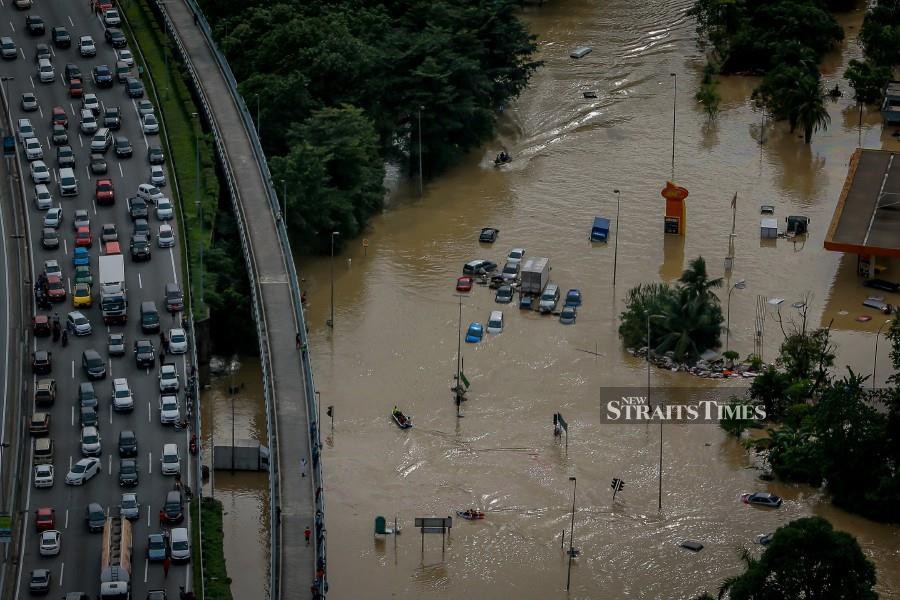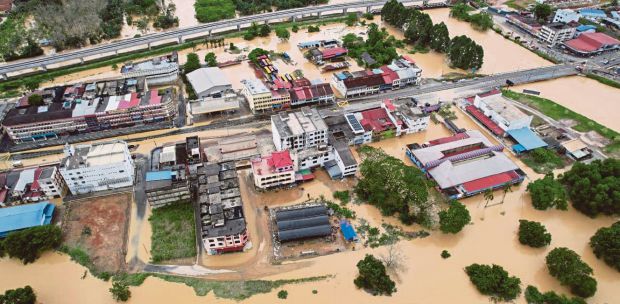2021 began with a full-blown pandemic in January (the death toll had reached the 600 mark on Jan 17) and ended with a massive flood last week.
By Dec 23, we had 31,265 people dead due to Covid-19, with 6,316 brought-in-dead cases.
More than 25 million had been fully vaccinated and more than four million had their third (booster) dose up to Dec 17.
While there is no clear sign that the pandemic will be gone anytime soon, on Dec 3 we had our first case of the Omicron variant — a South African national tested positive for it.
Any hope that this year would end on a cheerful note was dashed on Dec 21 when Malaysia's "once in a 100 years flood" hit hard several parts of the country, particularly the Klang Valley and Pahang.
The calamity was not just in the loss of lives, but the sense of despair and expression of sorrow by the flood victims.
Many who were trapped on rooftops and in vehicles cried out: "Where is the government? When is help coming?"
This daily's Leader on Dec 25 said it all, "Our helping angels: Ordinary Malaysians stepped in for absent government".
Could this unusually bad weather have been predicted? Some quarters believe so.
Environment and Water Ministry secretary-general Dr Zaini Ujang said the downpour, which started on Dec 17 and lasted for more than 24 hours.
It was equivalent to the average rainfall for a month — a "once
in a hundred years" weather event.
The phenomenon that caused the downpour (a tropical depression in the South China Sea) was "initially detected by the Meteorological Department on Dec 12."
If that's true, our authorities had at least a week's warning to prepare for the deluge.
Meteorologist Dr Azizan Abu Samah of Universiti Malaya said: "The authorities could have predicted the flood and should have done more."
If Dr Azizan is right, then
the government has failed its people.
Former cabinet minister Tan Sri Rafidah Aziz expressed her regret that Nadma (National Disaster Management Agency) had "only convened a meeting several days after the floods had ravaged so many places".
She saluted our military's readiness "to take on the responsibility of evacuating the flood victims". Without mincing her words, she said "Nadma itself is a disaster".
On Dec 23, Nadma chairman, Minister in the Prime Minister's Department (Special Functions) Datuk Abdul Latiff Ahmad, told the media he was prepared to resign, but asked: "How will that solve the problem?"
He insisted that the floods
were "unexpected".
Hulu Kelang state assemblyman Saari Sungib regarded the late response from the federal government as "sabotage" against the state government.
He said Selangor Menteri Besar Datuk Seri Amirudin Shaari had called the prime minister on Dec 17 to request the use of government assets to assist residents.
He said in cases of flood disaster, relief work should be carried out by the National Security Council chaired by the prime minister, with the Selangor menteri besar as a member.
A major rescue operation can be carried out only by the federal government, he added.
Instead, the prime minister had appointed Entrepreneur Development and Cooperatives Minister Tan Sri Noh Omar to lead the task.
The "turf war" between Amirudin and Noh, and the latter's "flood debacle" later, made headlines, causing more confusion about who was in charge.
Up to Dec 24, the flood death toll had climbed to 41, but there are fears the number will go up, with at least eight people missing.
More than 68,000 people have been evacuated to relief centres, but hundreds of roads remain closed.
A foreign news portal (https://asia.nikkei.com/) commented that this disaster is likely to change public perceptions of the administration.
Quoting an academic from the Nottingham University's Asia Research Institute Malaysia, the news portal stated that Malaysia's "major problem was lack of coordination and leadership to handle the disaster, not its capacity".
I agree.
We certainly have adequate assets and manpower to undertake rescue operations in any national disaster. Our problem is the absence of leadership.
So we bid farewell to this year — a year of calamity. Will next year be better, worse or more of the same?
The writer was a federal counsel at the Attorney-General's Chambers and visiting professor at Universiti Teknologi Malaysia. He is now a full-time consultant, trainer and author






